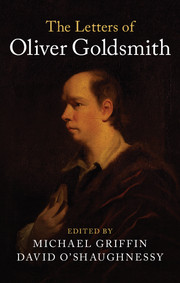Introduction
Summary
Though he wrote copiously across the genres in order to provide for himself, Oliver Goldsmith's corpus of letters is one of the least extensive of any major writer of his age. His ‘disinclination to epistolary communication’ was, according to James Prior’s 1837 biography, well known. James Grainger's letter to Goldsmith's friend and first biographer Thomas Percy, of 24 March 1764, records as much: ‘When I taxed little Goldsmith for not writing as he promised, his answer was, that he never wrote a letter in his life; and faith I believe him – except to a bookseller for money.’ Though not exactly true, it was certainly the case that, except for professional requests and courtesies, Goldsmith's correspondence, never copious to begin with, dwindled considerably once he had established himself in London. His communications became less effusive than those he sent to family and friends when he first set off on his medical studies in Edinburgh and Leiden and upon his first arriving in London. Once established, Goldsmith composed letters largely as or for favours. It is fair to say that, apart from missives to George Colman and David Garrick regarding theatre matters, and more particularly the production of The Good Natur’d Man in 1767, correspondence is sparse. Only in 1773 is there another flurry of correspondence concerning the production and positive reception of She Stoops to Conquer.
The paucity of the corpus is evidence, perhaps, of Goldsmith's general lack of interest in biographical posterity, and it has long been the first obstacle to those who sought to reconstruct the life. Early biographers James Prior and John Mitford corresponded regarding this lack of biographical and epistolary materials. Prior wrote:
I fear you found the pursuit of documents for the Life, laborious and unsatisfactory. It is astonishing how few there are available to the biographer. My search has been very extensive and unremitting for fourteen months; and though certainly I have gleaned a great deal, and found much new matter in his literary history and many press and political pieces not acknowledged by him, but unquestionably genuine, I find much difficulty in seeing letters of his which exist.— the illiberality of some of the collectors is surprising;
- Type
- Chapter
- Information
- The Letters of Oliver Goldsmith , pp. xv - lxiiPublisher: Cambridge University PressPrint publication year: 2018



